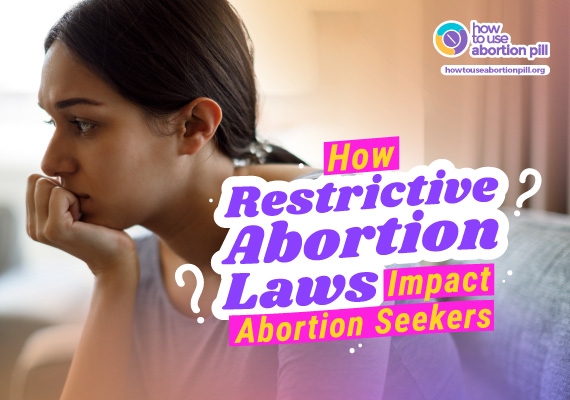In the complex landscape of reproductive rights, legal restrictions on abortion vary widely across the globe, manifesting in different forms that deeply impact individuals seeking this healthcare service. From gestational limits and mandatory waiting periods to parental consent requirements, these measures create a challenging environment that goes beyond the legal realm, affecting emotional well-being and economic stability and disproportionately impacting marginalized communities.
In this blog, we will delve into the multifaceted repercussions of restrictive abortion laws. By exploring these dimensions, we aim to foster a deeper understanding of the far-reaching consequences of restrictive abortion measures and advocate for comprehensive reproductive health care that upholds individuals’ rights and well-being.
Types of Restrictive Measures
Legally restrictive measures on abortion take many different forms. For example, gestational limits impose strict timeframes for legal abortions, infringing on people’s reproductive rights and hindering access in cases of unforeseen complications. Mandatory waiting periods, aimed at promoting thoughtful decision-making, are another time-related restriction. These require people to wait a specified duration between their initial consultation and the actual abortion procedure. Then there are the parental consent requirements. Designed to involve parents in minors’ abortion decisions, it compromises the autonomy and privacy rights of young people, particularly those in unsafe family situations.
All of these legal restrictions have profound impacts on those seeking abortion, some of which we will now explore.
Emotional and Psychological Impact
Restrictive abortion laws create an environment of heightened stress and anxiety for individuals seeking abortion services. The fear of legal consequences worsens the emotional toll on those already struggling with an important decision.
Abortion seekers also often face stigmatization and harsh societal judgment due to the restrictive legal landscape surrounding abortion. This social scrutiny can lead to feelings of shame and isolation, impacting individuals’ overall well-being.
Furthermore, the restrictive nature of abortion laws contributes to a negative impact on mental health. The prolonged uncertainty, coupled with the societal stigma, can lead to long-lasting emotional scars, affecting the overall well-being of those seeking abortion services.
Economic Consequences
Restrictive abortion laws force individuals to navigate a complex web of obstacles, including financial burdens. The costs associated with seeking abortion in such environments, such as traveling to another place, create a strain on the pocket.
The limitations imposed by restrictive abortion laws also often lead to increased healthcare costs. The lack of access to safe and legal abortion services may push individuals towards riskier alternatives, resulting in higher medical expenses and complications.
Additionally, abortion restrictions can have a profound impact on individuals’ employment and economic stability. The need to navigate legal and logistical challenges may lead to disruptions in work, potentially jeopardizing financial security and stability.
Unsafe Alternatives
The restrictive legal environment fosters the rise of unsafe and illegal abortion practices. Individuals, faced with limited options, may resort to dangerous methods, putting their health and lives at risk.
The prevalence of unsafe abortion practices also contributes to an increase in maternal mortality rates. Restricted access to safe and legal abortion services amplifies the dangers associated with clandestine procedures, disproportionately affecting vulnerable populations.
What’s more, restrictive laws create significant barriers to accessing safe and legal abortion services. Geographical constraints, legal hurdles, and a lack of available providers contribute to a scenario where individuals are forced to compromise on their safety and well-being.
Marginalized Groups
Restrictive abortion laws widen existing disparities in access to reproductive healthcare. Individuals of lower socio-economic status face additional challenges in navigating legal and financial barriers, compounding the inequality in access to abortion services.
Also, marginalized communities, including women of color and LGBTQ+ individuals, bear a disproportionate burden under restrictive abortion laws. The intersectionality of these identities compounds the challenges, creating a scenario where access to safe and legal abortion is even more limited.
The intersectionality of factors such as race, gender identity, and socio-economic status creates a web of challenges that exacerbate existing inequalities.
Abortion Laws in Your Country
Abortion is a healthcare service that has sadly been turned into a controversial topic by certain opponents. However, this doesn’t change the fact that everyone has a right to a safe abortion.
If you are an abortion seeker and want to know the legal landscape of your country, visit the ‘Abortion in Your Country’ section of our website. Here you will find all the relevant information, which will help you understand the laws of your land and make your decision.
We’re a non-profit organization on a mission to improve access to safe abortion. Aside from providing information about abortion laws around the world, we share facts and resources about the abortion pill—where to get it from, how to use it, and what to expect. If you have questions, you can always get in touch with us via info@howtouseabortionpill.org.

